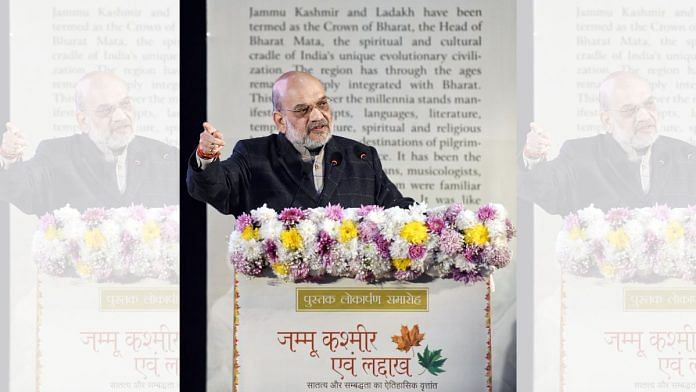


New Delhi: Union Home Minister Amit Shah Thursday said that Article 370 planted the seeds of separatism in the minds of Kashmir’s youth and emphasized that under the leadership of Prime Minister Narendra Modi, the central government has not only eradicated terrorism in the valley but also dismantled the entire ecosystem that supported it.
Shah was speaking at the launch of a book titled Jammu Kashmir and Ladakh: Through the Ages which seeks to present the story of Jammu & Kashmir and Ladakh. The book was compiled and published by the National Book Trust, India, in collaboration with the Indian Council of Historical Research (ICHR).
The Union minister also said that Kashmir is known as the land of Kashyap (a vedic sage), and “perhaps it has been named after Kashyap only.”
“Hum sab jaante hai Kashmir ko Kashyap ki bhumi ke naam se bhi jaana jata hai. Shayad ho sakta hai unke naam se hi Kashmir ka naam pada hoga (we all know that Kashmir is also known as the land of Kashyap; perhaps Kashmir was named after him),” he said.
Shah said Article 370 created the false impression that Kashmir’s integration with India was temporary. The Modi government abrogated Article 370 in 2019 revoking special status granted to Jammu and Kashmir and Ladakh, and reorganised the region into two Union Territories.
The Union Home Minister also said that people often ask him about the link between Article 370 and terrorism.
“Many people ask me what the relation between Article 370 and terrorism is. They don’t know Article 370 planted the seeds of separatism in the minds of youth in the valley. There are Muslim populations in many parts of the country. Why aren’t those areas affected by terrorism?” he asked.
He added, “Some say Kashmir’s proximity to the border with Pakistan is the cause of the problem. But Gujarat is also close to the border, as is Rajasthan. Why hasn’t terrorism spread there?”
Noting that over 40,000 lives were lost due to terrorism in Kashmir, he said, “The Modi government has not only ended terrorism in Kashmir but also dismantled the entire ecosystem that sustained it.”
“For years, the country watched in silence as violence plagued the region. After the revocation of Article 370, incidents of terrorism have reduced by 70 percent, proving that Article 370 was a catalyst for fueling terrorism,” he said.
“There were 2,100 incidents of stone pelting in Kashmir in 2018 but in 2024 not a single incident of stone pelting took place,” Shah added.
Shah also said when Article 370 was incorporated into the Constitution, the people did not want it. “Even in the Constituent Assembly, the majority opposed it. Yet, it became part of the Constitution. Fortunately, some farsighted leaders viewed it as a temporary provision. But, artificial things do not last long. Due to Prime Minister Narendra Modi’s strong will, on 5 August, 2019, Article 370 was abolished. Modi ended one of the darkest chapters in post-independence India’s history,” he said.
Shah highlighted the significant changes in the valley since the revocation of Article 370. “Since then, Kashmir’s development has begun, just like any other part of India. The local body elections were held successfully, with over 25,000 people elected as panch, sarpanch, or district council members. Lok Sabha and assembly elections were held peacefully, and this year, Kashmir saw the highest voter turnout ever,” he said.
He also noted the positive impact on tourism and industry: “Over 2.11 crore tourists have visited Jammu & Kashmir. In 2024 alone, 324 films and serials were shot in Kashmir, bringing back the golden era of the 1960s.”
He questioned the Congress for not doing even 10 percent of the development work done by Modi government in the last 10 years during its time in government.
Delhi has always had a lot of influence on how history has been written so far, he said. “History cannot be written sitting here … time has come to get rid of the history written to please the rulers.” He praised ICHR for the book and said it has a historical account of continuity and integration, dispelling myths and presenting the truth.
“Time has come to get rid of history written to please the rulers,” he said.
Also Read: Silent on Article 370, Omar govt resolution on J&K special status gets Congress, AAP support



